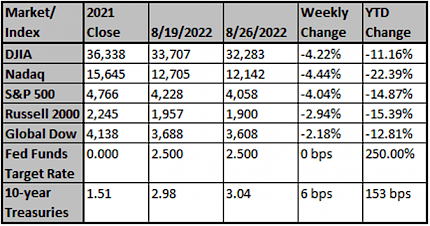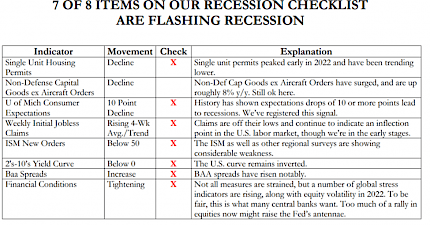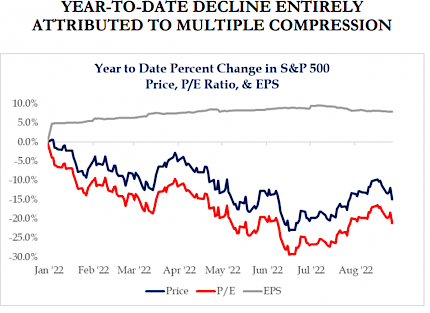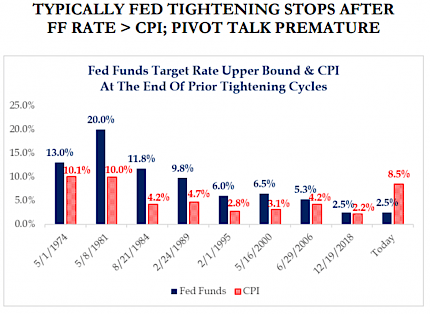Equities were sharply lower last week with the S&P -4.0%, its worst week in ten. Friday’s Fed Chair Powell’s Jackson Hole speech was the catalyst for the significant Friday decline as he signaled that the Fed is willing to risk recession to lower inflation. Best performers were energy (+4.3%), materials (-1.3%) and utilities (-2.6%). Worst sectors were technology (-5.6%), communication services (-4.8%) and consumer discretionary (-4.7%).
We recognize that we send out a lot of material. The risk in that of course is that both author and reader can lose sight of what’s truly important. Below please find our bullet point base case on the economy and the markets. In essence, it’s what we think, we think.
- A key catalyst for the equity rally that started June 16 was consensus moving to view that the Fed will be able to engineer a “soft landing” and avoid a recession. (History shows that many investors look for a soft landing in the early stages of a downturn.)
- The strength of the summer rally caused some momentum-based indicators to suggest the worst of the bear market is over, but the macro backdrop of yield curve inversions, money supply growth decline, and further rate hikes argue for an unsettled period for equities, with some possibility of retesting the low.
- So far this earnings cycle, capex discipline in energy has been good. As long as that continues, it bodes well for energy earnings and stock prices.
- Our biggest non-consensus view is that earnings estimates are much too high for 2023 and the market is still at risk
- Market declines thus far have been driven far more by multiple compression than earnings adjustments
- In a typical recession earnings fall 30%
- Growth in inflation may have peaked but the run-rate of inflation will be higher than pre-pandemic due to wages, rents, and the impact of environmental policies on the price of oil and metals markets
- Still too many signs of excess liquidity – meme stocks, Andreesen Horowitz investment in Adam Neumann venture, etc.
- Biggest under-reported story is the energy crisis in Europe and concomitant spike in inflation – 37% increase in PPI in Germany. Major political changes on the Continent are likely as odds of a recession in Europe increase dramatically
- Higher inflation for longer suggests shorter duration equities that return money to shareholders will outperform long-duration stocks trading at steep price-sales ratios
- Market bottoms usually associated with lower earnings multiples, a higher VIX, and a blowout in high yield spreads. Have not seen that yet
- Geopolitical concerns lead us to favor domestic over international, value over growth, and high-quality small over large (S&P 600 vs. RUT)
- Overweight Energy, Consumer Staples, Health Care, and Utilities
- Major themes are: deglobalization, Fed tightening & Quantitative Tightening, “sticky” inflation, and economic slowdown
- Surveys of clients suggest too much complacency on bonds and growth stocks
- Greatest risk to economy and markets may be the Fed’s need to tighten more than risk markets anticipate
WEEKLY ECONOMICS SUMMARY
Consider the punch bowl removed. Fed Chair Powell spoke about fighting inflation in his Jackson Hole speech last week, saying “we must keep at it until the job is done.” Former Fed Chair Paul Volcker previously wrote a book titled “Keeping At It: The Quest for Sound Money and Good Government”. What could the Fed realistically say that’s more hawkish than evoking Paul Volcker?
As we’ve noted previously, a “peak inflation” story has been providing a reprieve for risk assets. The core PCE price index was up just 0.1% m/m and slowed to 4.6% y/y in July. U of Michigan long-run inflation expectations slowed to 2.9% in August. The Cleveland Fed inflation tracker indicates August should show another low m/m headline CPI number.
But the FOMC has a broader focus than just “peak inflation”. True, the slowdown in inflation means the pace of rate hikes does not have to continue at the +75bp aggressive clip of the past two FOMC meetings, especially with Quantitative Tightening (QT) ramping up. Yet the Fed should not pursue a stop-and-go strategy – this was a mistake in the 1970s that did not work out well (ie, it led to stagflation). The FOMC knows this. Powell noted in his speech last week that “the historical record cautions strongly against prematurely loosening policy.” The “unconditional” pursuit of price stability may indeed cause economic “pain,” but that was understood & considered worth it.
A policy pivot could be slower rate hikes in Sept-Dec, but the bar for rate cuts any time soon remains quite high in our opinion. The Fed is set to hike & hold, based on their recent communications.
So where will they hike to? An important question remains: where does core inflation settle out? The Dallas Fed trimmed mean PCE held at 4.4% year over year in July. Restrictive monetary policy would require a positive real fed funds rate (ie, fed funds above the inflation rate), especially with fiscal authorities continuing to push funds into the economy.
Bottom line: demand in excess of supply has generated inflation, which is threatening to become entrenched. So, numerous policymakers have taken aggressive action. Reuters reported last week that European Central Bank (ECB) members wanted to discuss a possible +75bp hike at their next meeting. In the U.S., the first step was to get from emergency policy (0% fed funds) to the FOMC’s view of long-run neutral (~2.5%). This move happened quickly. Powell noted last week that “with inflation running far above 2 percent and the labor market extremely tight, estimates of longer-run neutral are not a place to stop or pause.” The next step for the Fed will be to move from neutral policy to restrictive/tight.
The FOMC is still looking for a slowdown in demand, to gauge when they have reached restrictive territory. Importantly, the U.S. labor market is still overheating (eg, initial jobless claims at 243,000 last week). The U.S. economy is trying to look like 2019, but without a 2019- balanced labor market. Labor force participation remains lower & we are running into a demographic wall as time goes by. So there’s more restraint to come. The U.S. 2yr/10yr yield curve remains inverted. Housing (interest rate sensitive) is weakening. Some softening in the U.S. labor market (unfortunately) looks necessary – we’ll continue to monitor the U.S. nonfarm payrolls data. We expect employment gains to slow.
To sum up: there is already some evidence the U.S. economy is weakening (eg, weak real GDP in 1H of 2022, terrible productivity, money supply slowing). But this weakness can’t be the main focus of central bankers. Anchoring inflation expectations remains a process, which is not yet complete. Peak inflation remains different from mission accomplished. Until supply catches up to (slowing) demand, restraint is what is necessary to bring inflation under control – tight policy must persist.
Source: Strategas

Chart reflects price changes, not total return. Because it does not include dividends or splits, it should not be used to benchmark performance of specific investments. Data provided by Refinitiv.
Sincerely,
Fortem Financial
(760) 206-8500
team@fortemfin.com
Latest News
The Fed: Shrinking the Fed's balance sheet sheet is not l...
Research presented at the Fed's Jackson Hole conference suggests that the central bank's shrinking of its balance sheet is not likely to be a benign process.
MarketWatch
Dow Futures Extend Declines After Powell Reiterates Hawki...
Terms And Conditions
InvestmentNews
Economy Week Ahead: Job Market and Home Prices in Focus
Reports on job openings and employment trends will provide an update on the state of the labor market.
The Wall Street Journal



